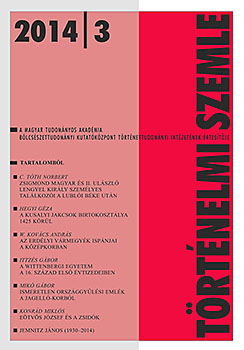Ismeretlen országgyűlési emlék a Jagelló-korból. Adatok az 1507 és 1514 közötti országgyűlések történetéhez, valamint Werbőczy Hármaskönyvének elkészültéhez
New Parliamentary Record from the Jagiellonian Period Remarks on the History of Parliaments between 1507 and 1514 and the Making of Werbőczy’s Tripartitum
Author(s): Gábor MikóSubject(s): Political history, 16th Century, The Ottoman Empire
Published by: Magyar Tudományos Akadémia Bölcsészettudományi Kutatóközpont Történettudományi Intézet
Keywords: responsio; Hungary; Stephen Werbőczy; History of Parliaments; 1507 - 1514
Summary/Abstract: The source analysed in the study is a so-called „response” (responsio), which was transmitted by the nobility, constituting the lower chamber of the parliament in late medieval Hungary, to the ruler and chief dignitaries seated in the upper chamber. The text was beyond doubt written during the assembly which was convoked in January 1513 because of the increasing Ottoman threat. The proposal of the barons in answer to which the responsio was drafted has unfortunately been lost; its content can consequently only be reconstructed from the latter. The upper chamber wanted to negotiate about a campaign to be launched against the Ottomans, but the nobility made their consent to it dependent on a number of conditions. Before all, they desired the confirmation of decrees accepted in the course of previous parliaments. These were aimed partly at guaranteeing the role of the nobility in the government of the kingdom, partly at increasing the efficiency of the judicial system. Some among the articles have preserved details from decrees which have not survived. Connected to the efforts to brush up the judicial procedure was a demand which had already been discussed in the previous parliaments, but received a much more detailed treatment in the responsio than ever before. The matter in case was the collection of the ancient laws of the kingdom, a task that, as stated by the decree, was entrusted late in 1512 by the king to Stephen Werbőczy. The importance of this piece of information lays in the fact that, in the absence of any concrete evidence, the date of the royal commission was in the previous literature either assigned to 1504 by way of conjecture, or not precisely defined at all. Besides the light it sheds on a number of parliaments which were held around the turn of the 15th and 16th centuries, the response also merits analysis from the perspective of its genre. On the basis of the available source material, before all the reports of foreign ambassadors, it has long been known that in the late medieval parliaments the chief dignitaries (and together with them the king) generally met separately from the nobility, and the two bodies communicated with each other through delegations. The document presented in the study proves that the procedure was much more formalized than hitherto thought on the grounds of the foreign reports. To put it another way, the dual system of royal/baronial proposals and noble responses given thereto, which was the key feature of the diets in the post-1526 period, can now be shown to have functioned before Mohács – and in this respect the responsio is really unique in its kind.
Journal: Történelmi Szemle
- Issue Year: 2014
- Issue No: 03
- Page Range: 455-480
- Page Count: 26
- Language: Hungarian

